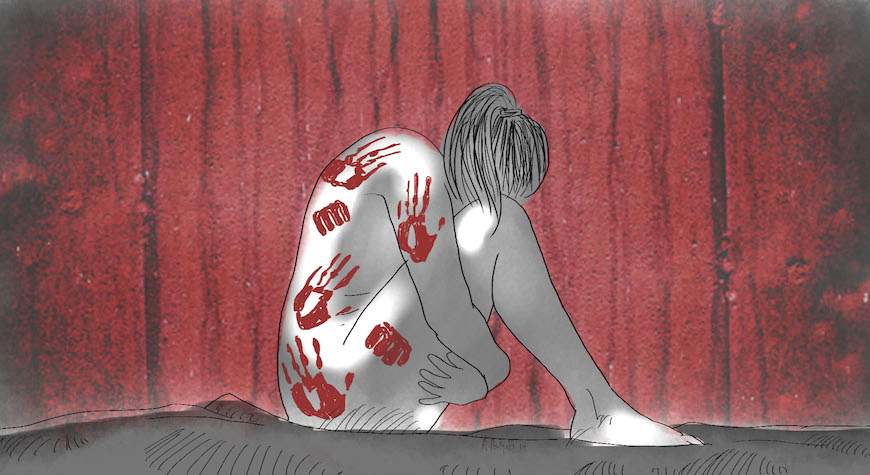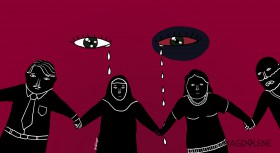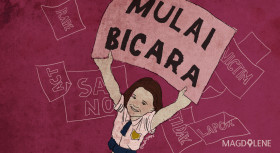While worrying about surviving the lockdown in her boarding house room throughout the COVID-19 pandemic “Marisa” were worrying about her mother and sister who have been trapped with her father at home in Surabaya.
Since she was young she often witnessed her father abuse her mother physically and verbally, Marisa said. Growing up, she and her siblings became the target of the man’s abuse. Luckily, the 20-year old and her older sibling got to leave the house after getting a job as administration officers, earning daily wage that afforded them to rent a room in a boarding house. But her mother and 8-year-old brother had to endure the hell they called home.
“I was told by a neighbor last week that Dad had kicked Mom out of the house. Mom has a phone, but it can only be used for phone calls and text messages, and she hardly ever has credit. I usually send her money every month but now because of corona I don’t go to work every day,” Marisa told Magdalene recently.
“Dad also forbids Mom from seeing her friends. But my mom still loves him, she refuses to separate from my dad. According to our neighbors, after getting kicked out Mom ended up coming back home.”
When the social distancing policy came into effect last month, her father didn’t remain at home. Instead he continued to frequent coffee shops and karaoke places with his friends, said Marissa, quoting her neighbor’s statement.
“I’m actually very worried, afraid that he might infect Mom and my younger sibling. But what can I do? He won’t listen,” she said, adding, “I hope Mom can get as far away from that person.”
For victims of domestic violence, social distancing and appeals to work from home in order to prevent the spread of COVID-19 have left them trapped with perpetrators of violence, leaving them isolated from the people and resources that can help them.
In the United States, according to a Time magazine report, the National Domestic Violence Hotline reports an increasing number of callers who claim their abusers use COVID19 as a weapon against them to further isolate them from family and friends.
Time also reported an increasing trend of complaints of cases of violence against women in private homes around the world ever since countries and cities enforce physical distancing policies, including in the U.S. and China. In China, reports of violence at home received by the police increased three times in February compared to last year.
In Indonesia, with 790 positive cases, 31 recoveries, and 58 deaths as of March 25, data and reports as such has yet to be found. However, physical distancing has restricted victims of domestic violence from seeking help.
Also read: Marriage Lessons from Being Quarantined with My Parents
This situation describes Marisa when she sought help from a service provider unit in the Surabaya area. She called several organizations multiple times, but failed to receive a single answer, until she finally got a response from a women crisis center.
“At first, the service providers said they could be invited to speak directly. But later on because of the pandemic and several areas in Surabaya being declared as red zones, the service provider refused to meet in person," Marisa said.
She said she was desperate to get her mother and younger sibling out of the house and put her father behind bars. But the current situation just isn’t making it possible.
“I want to report it to the police, so they can take action against Dad and Mom can be free,” Marisa said.
Obstacles in handling during the pandemic
The National Commission on Violence against Women’s (Komnas Perempuan) 2019 Annual Report show violence in private spheres including at home still makes up the most reported cases of violence against women in Indonesia, totaling 11,105 cases, up from 9,637 cases in 2018.
The same report saw violence against young girls rose from 1,417 cases in 2018 to 2,314 cases in 2019. The largest number cases continue to be violence against wives at 6,555 cases, and increase from 2018 with 5,114 cases. This shows that homes and families are still unsafe territories for women.
Komnas Perempuan Commissioner Mariana Amiruddin said the reports they received show that following the government’s appeal to work from home and social distance, there were concerns that many women would be trapped with their abusers at home.
“The #stayathome policy has overlooked the vulnerability women face, one of them being female victims of domestic violence. We’re worried that social distancing policies keep victims of violence stuck with their perpetrators,” Mariana told Magdalene.
The pandemic has also forced Komnas Perempuan has adjust its service, said Mariana. The Commission now prioritizes receiving case reports only by phone and online, she added.
"Because the regulations were only implemented on March 21, we are still in adjustment stage in receiving complaints," said Mariana.
She added, because Komnas Perempuan has the duty to provide recommendations and referrals, their performance is hampered because several government agencies are also occupied with matters relating to the pandemic.
"These institutions are also busy making changes in their internal systems because of the pandemic. There’s a lower chance of getting quick responses whether from the police or the court. Many trials have also been postponed due to the current situation," said Mariana.
Also read: Pandemic Shows How the Future is Not for Everyone
Lack of emergency hotlines
Coordinator of the legal aid institute for women Pelayanan Hukum Lembaga Bantuan Hukum Asosiasi Perempuan Indonesia untuk Keadilan (LBH APIK), Uli Pangaribuan said her organization has been faced some challenges because of the social distancing policy. LBH APIK has applied the work-from-home policy since March 16, and all complaints were directed online through the WhatsApp application.
“We’ve extended consultation hours from 9 in the morning to 9 in the evening,” Uli told Magdalene.
If the victim needs help quickly and wants to report to the police, Uli said a worker would direct the victim to report to the police station and contact investigators who are associated with LBH APIK.
“We will give guidance on how to report and who to report to. After that we will give the investigator’s number. From then on, we will conduct further follow ups,” she said.
“If the victim would like a psychological counseling in the government-run Integrated Center for Women and Children Empowerment or Pusat Pelayanan Terpadu Pemberdayaan Perempuan dan Anak (P2TP2A) unit, they would have to coordinate with it first,” Uli said.
She added that after the new system went into effect, more complaints were filed compared to usual, which is more or less 10 complaints a day.
Another issue is that there is yet a special quick-response hotline system that has been reintegrated to handle gender-based violence. Mariana said that although some hotline numbers have been provided by the government, those numbers are not operated optimally yet.
“But for cases such as domestic violence, the handling is far from quick. The response is very slow,” she added.
Mariana reminded that the “work-from-hom” policy is not as easy as people imagined. Unequal power dynamics between the husband and the wife does not only result in physical violence, it also adds to the burden borne by the mother.
“Can you imagine how complicated it would be to move public matters home without good family management. Especially if that family is experiencing domestic violence,” said Mariana.
“Therefore stay at home policies should include an appeal to create a more equal environment in a household, so that there will be changes at home too.”
Translated by Tabina Amarilla from the original version in Indonesian, this article is supported by Splice Lights On Fund grant from Splice Media.
If you or someone you know need help to get out of domestic or online violence, contact Komnas Perempuan at 021-3903963 or [email protected]); or Lembaga Bantuan Hukum Asosiasi Perempuan Indonesia untuk Keadilan (LBH APIK at 021-87797289, WA: 0813-8882-2669, and [email protected]). Click the complete list of all service institutions/organizations here.








Comments